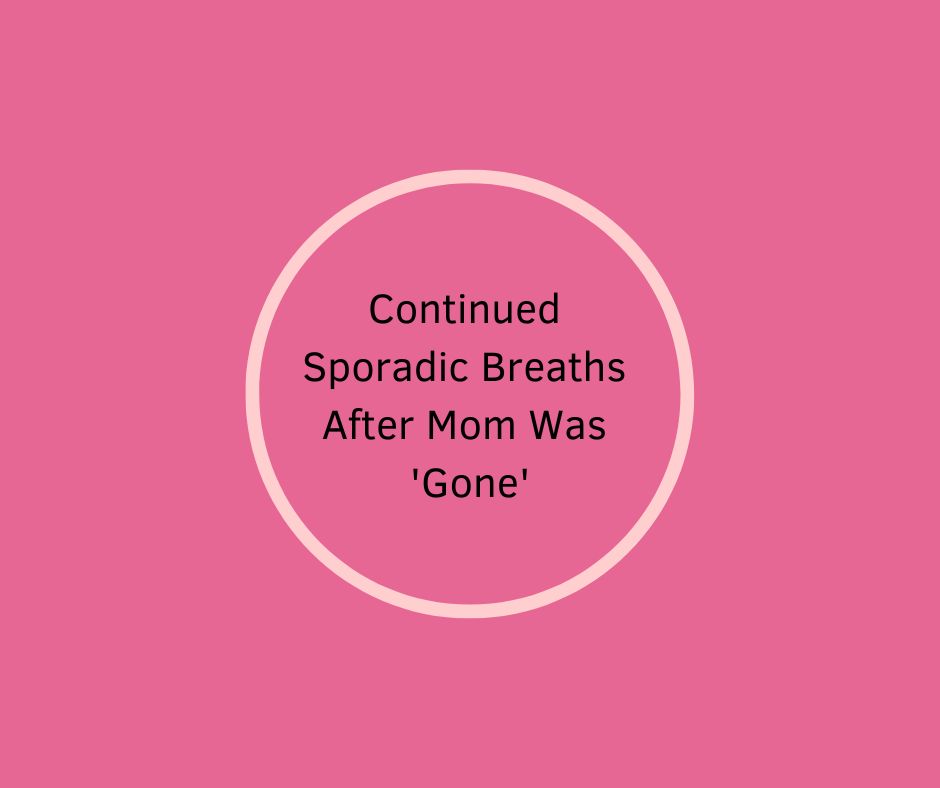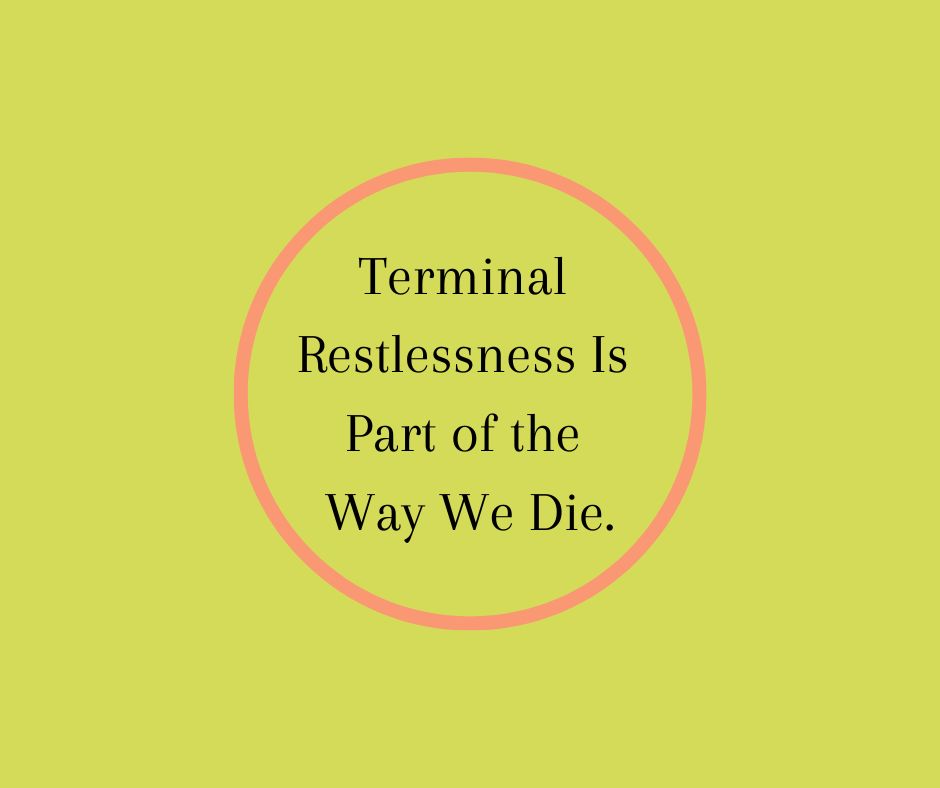First let’s clarify the word dying. Aside from the fact that we are all dying a bit with every breath we take, that life is a terminal illness, there comes a time when the body’s breathing, functioning ends.
The above is the time I am referring to when I say dying is not a medical event. It is the days to hours before death actually arrives.
The months before death and the weeks of labor before death is when the body is approaching death but not actually dying. I know: semantics, but some people are wondering.
In the months and weeks before death, medical intervention and medical tools are an active part of care. Pain management, skin care, mouth care, and bowel and urine care are all a medical part of the care needed. Doctors and nurses play an active role in this care.
If there is pain (not all diseases cause pain), then pain management will be a big part of physical and medical care. Nurses and physicians will assess and manage symptoms as part of their medical care. Skin care and mouth care gets medical attention.
It is in the days and hours before death that care shifts. Care becomes communal, interactive, guidance centered. You don’t need a doctor or a nurse. Medical care is not the issue. Supportive care is what is needed. Care for the watchers.
The person who is actively dying is so removed from their body that there isn’t much doctors and nurses can do for or with them. The person is in the last throngs of the labor to leave this world. They are giving the “final push” to leave their body. Only they can do that.
At this important time you need someone knowledgeable in the dying process. A person who understands what this releasing moment is about. A person that can guide those present. A person who can address the fear the watchers are experiencing. Who can neutralize the fear. A person that can be a “conductor” of those present to help them have a sacred experience with their special person’s last moment.
This is what end of life support and guidance is about. Not the medical but the communal, supportive, knowledgeable guidance.
Something More... about Why do I say “Dying is not a Medical Event?”
On part 2 of my comprehensive 3 hour video, THIS IS HOW PEOPLE DIE, I talk about how to "conduct" the last hours before death with the family.








9 comments
Tori
Perfectly said. In hospice nursing I always tried to employ Jean Watson’s theory of Caring with a family. While I provided emotional care through the whole process, there is a definite shift when medical care is minimal (typically only including comfort measures) and spiritual or emotional care thoroughly takes over. It’s a beautiful transition as I see every part of the dying process as something to be blessed to be part of. People in their most vulnerable state bless a hospice nurse with allowing them into their home and heart with this precious moment. It’s overwhelmingly beautiful.
———
BK Books replied:
Hi Tory, Yes, the nurse, patient, family relationship during the ending of life process can be so special. That positive relationship will become a part of the sacred memory the family will carry with them. Thank you for the work you are doing and for sharing your thoughts with me. Barbara
Perfectly said. In hospice nursing I always tried to employ Jean Watson’s theory of Caring with a family. While I provided emotional care through the whole process, there is a definite shift when medical care is minimal (typically only including comfort measures) and spiritual or emotional care thoroughly takes over. It’s a beautiful transition as I see every part of the dying process as something to be blessed to be part of. People in their most vulnerable state bless a hospice nurse with allowing them into their home and heart with this precious moment. It’s overwhelmingly beautiful.
———
BK Books replied:
Hi Tory, Yes, the nurse, patient, family relationship during the ending of life process can be so special. That positive relationship will become a part of the sacred memory the family will carry with them. Thank you for the work you are doing and for sharing your thoughts with me. Barbara
Adriene
Yes yes yes!
———
BK Books replied:
Thank you, thank you, thank you. Blessings! Barbara
Yes yes yes!
———
BK Books replied:
Thank you, thank you, thank you. Blessings! Barbara
Jacalyn
Barbara, I can say absolutely that of I hadn’t read your series if books prior to my mum passing, neither she, I or my sister would have had the experience we did.
As a semi-medical person, I was hung up on the interventions and what we and the doctors needed to ‘do’.
After reading, it became a truly human event that we were able to understand, take an active part in and ensure a peaceful and pain-free journey for the greatest lady who ever lived.
I can’t thank you enough. You changed everything.
Grateful and heartfelt thanks.
———
BK Books replied:
Thank you Jacalyn for your kind words about my work.The help you found is what I wrote them for. Blessings! Barbara
Barbara, I can say absolutely that of I hadn’t read your series if books prior to my mum passing, neither she, I or my sister would have had the experience we did.
As a semi-medical person, I was hung up on the interventions and what we and the doctors needed to ‘do’.
After reading, it became a truly human event that we were able to understand, take an active part in and ensure a peaceful and pain-free journey for the greatest lady who ever lived.
I can’t thank you enough. You changed everything.
Grateful and heartfelt thanks.
———
BK Books replied:
Thank you Jacalyn for your kind words about my work.The help you found is what I wrote them for. Blessings! Barbara
Augie
Hi Barbara:
My beautiful wife passed away about a year ago. When I craved information about Dementia you were there. And that helped me so much. I was there with her when she took her last breath. The others had left the room. It was my wife’s last gift to me. It was the greatest privilege of my life taking care of this beautiful woman. Thanks for easing my pain.
———
BK Books replied:
Hi Augie, Your wife did give you a gift. A gift you are treasuring. Blessings! Barbara
Hi Barbara:
My beautiful wife passed away about a year ago. When I craved information about Dementia you were there. And that helped me so much. I was there with her when she took her last breath. The others had left the room. It was my wife’s last gift to me. It was the greatest privilege of my life taking care of this beautiful woman. Thanks for easing my pain.
———
BK Books replied:
Hi Augie, Your wife did give you a gift. A gift you are treasuring. Blessings! Barbara
Terry
Thank you, Barbara. Your explanations are so beautifully expressed and encouraging.
———
BK Books replied:
Thank you Terry for the kind words. Blessings! Barbara
Thank you, Barbara. Your explanations are so beautifully expressed and encouraging.
———
BK Books replied:
Thank you Terry for the kind words. Blessings! Barbara
Linda Newman
I have a # of your brochures and love your emails. I wonder if you can answer a question for me regarding when my Mother (with Alzheimer’s Disease) was dying in a nursing home. She was unresponsive other than when a nurse tried oral care. Mom clamped down on the stick. Also, when she was turned to clean her raw skim she yelped. Was she conscious? Semi-conscious? She only moved herself to lift off her gown. I’ve always been so curious. Any insight is appreciated. Thank you.
———
BK Books replied:
Hi Linda, about your mom, With dementia is it difficult to really put a word to actions and reactions. Maybe it was the physical interaction that triggered a physical response. Blessings! Barbara
I have a # of your brochures and love your emails. I wonder if you can answer a question for me regarding when my Mother (with Alzheimer’s Disease) was dying in a nursing home. She was unresponsive other than when a nurse tried oral care. Mom clamped down on the stick. Also, when she was turned to clean her raw skim she yelped. Was she conscious? Semi-conscious? She only moved herself to lift off her gown. I’ve always been so curious. Any insight is appreciated. Thank you.
———
BK Books replied:
Hi Linda, about your mom, With dementia is it difficult to really put a word to actions and reactions. Maybe it was the physical interaction that triggered a physical response. Blessings! Barbara
Deborah Roberts
Beautifully expressed, Barbara. Your experience speaks wise volumes!
———
BK Books replied:
Deborah, thank you for your kind words. Blessings! Barbara
Beautifully expressed, Barbara. Your experience speaks wise volumes!
———
BK Books replied:
Deborah, thank you for your kind words. Blessings! Barbara
Maureen Kures
Barbara, I always appreciate how you so eloquently impart your knowledge. This is a powerful message for families and caregivers to hear. Thank you!
———
BK Books replied:
Hi Maureen, you’re right. people need to know this information. Thank you for the affirmation. Blessings! Barbara
Barbara, I always appreciate how you so eloquently impart your knowledge. This is a powerful message for families and caregivers to hear. Thank you!
———
BK Books replied:
Hi Maureen, you’re right. people need to know this information. Thank you for the affirmation. Blessings! Barbara
Mindia
This was so beautiful. Thank you for these wise words.
———
BK Books replied:
Mindia, you are welcome. Blessings! Barbara
This was so beautiful. Thank you for these wise words.
———
BK Books replied:
Mindia, you are welcome. Blessings! Barbara